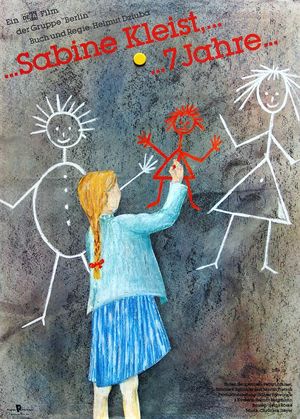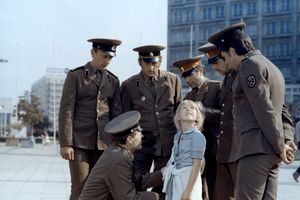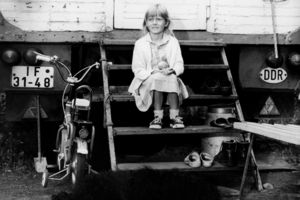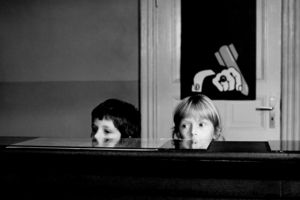Sabine Kleist, 7 Jahre ...
Director: Helmut Dziuba, 75 Min., Color, Feature Film
Deutsche Demokratische Republik (DDR)
DEFA-Studio für Spielfilme, 1982
- Film/Video Format
- 35 mm
- Length in m
- 1978
- English Title
- Sabine Kleist, 7 Years…
- Premiere Date
- Release Date (for Cinema)

(Dir.: Helmut Dziuba, 1982)
Short Summary (English)
Seven-year-old Sabine Kleist has lived in an orphanage since the death of her parents in a car accident. She has developed a very dose relationship to Edith, the group educator; who is like a second mother to her. But Edith is going to quit her job because she is expecting a child.
Sabine suffers from loss anxieties and runs away from the home.
For two days and two nights the little girl roams through Berlin trying to discover a new world for herself. She discovers and experiences a lot. She gets to know circus artistes, meets a labour veteran, finds out what joys and fears a young mother goes through at a maternity home. Finally, she meets a little foreign boy who is looking for his parents in the bustling city.
These numerous events and encounters come to make Sabine think. She has learned that other people are also troubled and grief-stricken. And that they, too, need comfort and consolation.
Of course, the little girl still needs warmth and security herself. But her pain is modified and she realises that, ultimately, her home is the orphanage - even if Edith has left.
Source: Progress Film-Verleih

(Dir.: Helmut Dziuba, 1982) Photography: Siegfried Skodula

(Dir.: Helmut Dziuba, 1982) Photography: Siegfried Skodula
Film Crew
- Director
-
- Helmut Dziuba
- Script
-
- Helmut Dziuba
- Scenario
-
- Helmut Dziuba
- Camera
-
- Helmut Bergmann
- Film Editing
-
- Barbara Simon
- Cast
-
- Petra Lämmel (Sabine Kleist)
- Simone von Zglinicki (Edith)
- Martin Trettau (Karl Schindler)
- Petra Barthel (Junge schwangere Frau)
- Johanna Clas (Kaufhallenchefin)
- Carl Heinz Choynski (Streifenführer)
- Peter Cwielag (Mann)
- Gert Gütschow (Mann mit Basstuba)
- Heide Kipp (Frau Marloch)
- Uwe Kockisch (Ediths Mann)
- Christa Löser (Tante)
- Klaus Piontek (Direktor des Heimes)
- Gudrun Ritter (Frau auf der Bank)
- Regine Hilz (Ritas Tochter)
- Lars Hillersheim (Stani)
- Axel Lindner (Junge)
- Gitta Schoof (Clowness)
- Thea Schmidt-Keune (Hebamme)
- Viktor Nikolajew (Starschina)
- Jürgen Huth (Genosse Obermeister)
- Edith Scheibler (Erzieherin)
- Dietmar Bauschke (Ordner)
- Christian-Victor Keune (Junger Mann mit Bart)
- Holm-Henning Freier (Freund des jungen Mannes)
- Ivar Beer (Sabines Nachbar)
- Rebecca Renau (Halbwüchsige)
- Torsten Wöhlecke (Halbwüchsiger)
- Ingo Schöne (Cäsar)
- Theresia Wider (Frau aus Wohnwagen)
- Harry Bend (Jongleur)
- Gertraut Last (Frau mit Brille)
- Michael Kolbe (Student an der Fahne)
- Gerald Schaale (Junger Kollege)
- Jörg Knochée (auch: Knoche) (Junger Mann)
- Eva Schäfer (Nachbarin von Karl Schindler)
- Annemarie Siemank-Ripperger (Betreuerin)
- Rolf Staude (Vater am Strand)
- Renate Usko (Mutter am Strand)
- Felix Neidel (Der Kleinste)
- Pia Ludwig (Die Große)
- Judith Schulz (Mädchen am Strand)
- Bodo Schmidt (Mann am Planschbecken)
- Gert Klisch (Mann am Schaufenster)
- Sandra Uhlich (Kind kleine Sabine)
- Assistant Director
-
- Peter Schmitz
- Assistant Camera
-
- Siegfried Skoluda
- Andreas Walle
- Production Design
-
- Heinz Röske
- Script Editing
-
- Anne Pfeuffer
- Music
-
- Christian Steyer
- Sound
-
- Edgar Nitzsche
- Christfried Sobczyk (Tonmischung)
- Costume Design
-
- Marianne Schmidt
- Evelin Benke
- Make-Up
-
- Klaus Petzold
- Margrit Neufink
- Props
-
- Rudolf Borchardt
- Peter Glaser
- Manfred Schlomski
- Production Management
-
- Günter Schwaack
- Unit Production Management
-
- Klaus Preissel (auch: Preißel)
- Heinz-Jürgen Schmidt
- DEFA Photography
-
- Siegfried Skoluda
Awards
- Sektion Theorie und Kritik des Verbandes der Film- und Fernsehschaffenden der DDR (1982): Kritikerpreis (Bester Kinderfilm 1982)
- 3. Nationales Festival "Goldener Spatz" für Kinderfilme der DDR in Kino und Fernsehen Gera (1983): Preis der Fachjury ("Goldener Spatz") in der Kategorie Spielfilm/ Fernsehspiel
- XIII. Internationales Filmfestival Moskau (1983): Preis für die beste Kinderdarstellerin im Wettbewerb der Kinder, Preis der Pionierorganisation der UdSSR - Petra Lämmel
- XXXII. Berlinale (1983): Preis der CIFEJ
- Festival in Alencon (1987): Zweiter Preis
Short Summary (German)
Seit dem Unfalltod ihrer Eltern lebt Sabine im Heim. Als die Erzieherin Edith, die ihr zur zweiten Mutter geworden ist, wegen der Geburt ihres eigenen Kindes ihre Arbeit aufgibt, läuft Sabine aus dem Heim weg. Zwei Tage und zwei Nächte ist sie in Berlin unterwegs, sucht Kontakte zu anderen Menschen. Sie gerät in einen Zirkus, an einen pensionierten Arbeiterveteranen, auf eine Dampferfahrt und in eine Kirche. Sie sucht Anschluss, hilft auch anderen - zum Beispiel einem kleinen polnischen Jungen, der seine Eltern aus den Augen verloren hat. Und sie begreift, dass die Beziehungen, die sie knüpft, nicht von Dauer sein können. Sie geht zurück ins Heim, das sie als ihr Zuhause erkennt.
(Quelle: Das zweite Leben der Filmstadt Babelsberg. DEFA-Spielfilme 1946-1992)
Short Summary (Other Languages)
Sabine scappa dall'orfanotrofio lo stesso giorno in cui la sua educatrice Edith entra in astensione obbligatoria dal lavoro per maternità. Per diversi giorni vaga da sola per la Berlino Est dei primi anni '80, prima di constituirsi alla polizia e ritornare all' orfanotrofio. La sua evasione in una realtà estranea alla percezione avutane fino ad allora diventa un viaggio di iniziazione che la cambierà per sempre. (Italienisch: Goethe-Institut Roma)
Depuis la mort accidentelle de ses parents, Sabine habite dans un home pour enfant. Lorsque l'éducatrice Edith, devenue pour elle comme une deuxième mère, décide d'arrêter de travailler pour la naissance de son enfant, Sabine s'enfuit du home. Elle ère deux jours et deux nuits dans Berlin et cherche le contact avec d'autres personnes. Elle atterrit dans un cirque, chez un travailleur à la retraite, sur un bateau à vapeur et dans une église. Elle aide également d'autres personnes, comme un jeune polonais ayant perdu ses parents de vue. Mais elle comprend que les relations qu'elle noue ne sont pas des relations qui peuvent durer et retourne dans le home, qu'elle finit par reconnaitre comme son chez-soi. (Französisch)
A pequena Sabine passou sua infância em um orfanato após a morte dos pais em um acidente de carro. Ela foge do orfanato no mesmo dia em que sua querida educadora entra em licença-maternidade. Vagueia pela cidade para encontrar alguém que cuide dela. Conhece muita gente, mas parece estar sempre deslocada em todos os lugares por onde passa. Por vários dias e noites ela perambula sozinha pelas ruas de Berlim Oriental, antes de se apresentar à polícia e retornar ao "lar". Embora concebido como um filme para crianças, está mais próximo de um filme para adultos, ao tratar de temas como perda, solidão, morte. É uma realização da DEFA completamente atípica. (Portugiesisch: atrás do muro havia cinema: filmes da defa, alemanha oriental 1946-1992)



